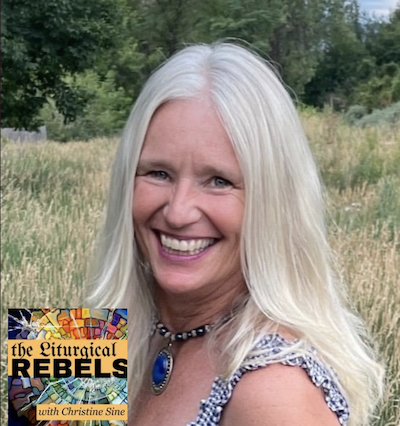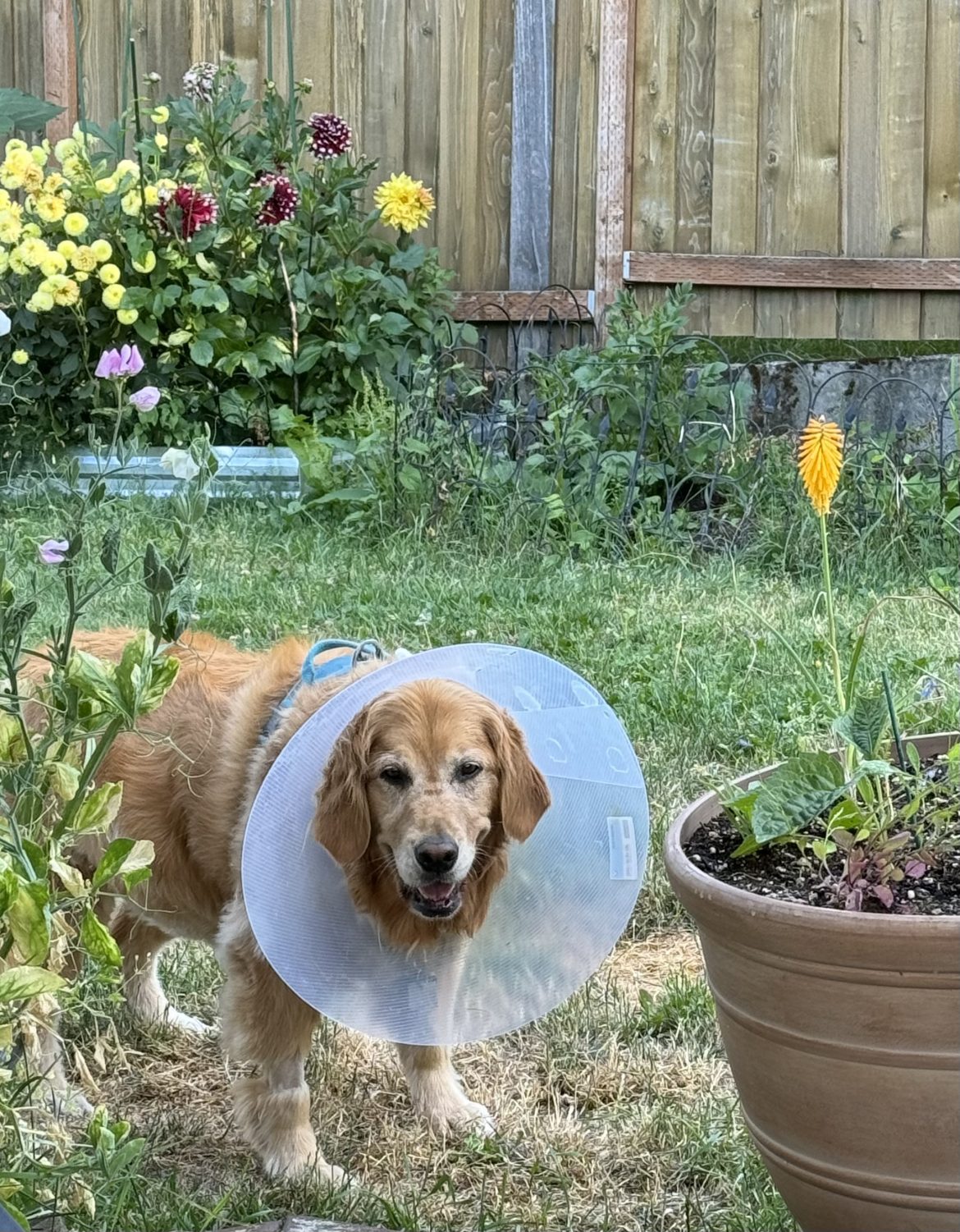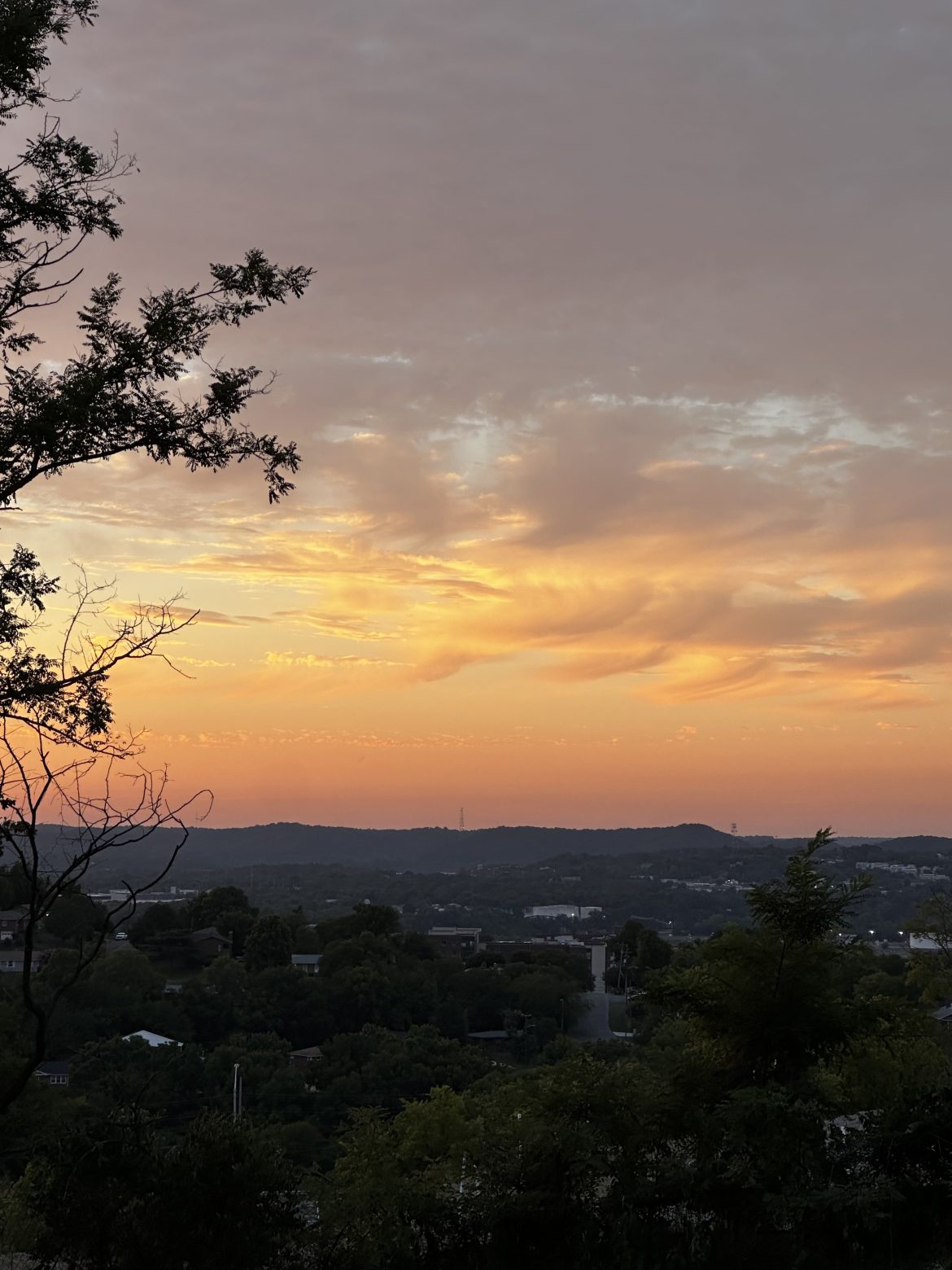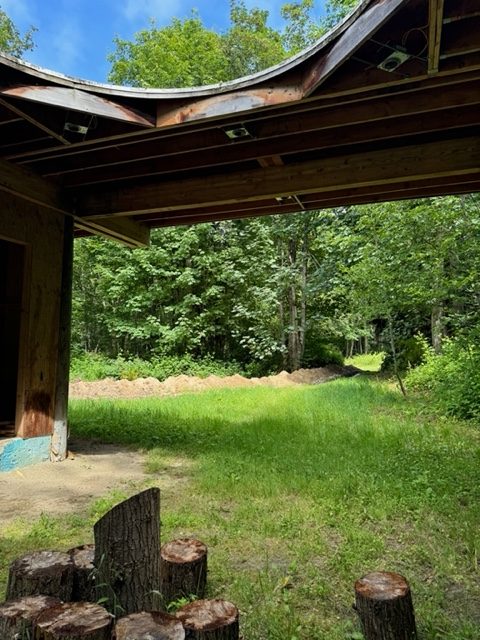Its been quite a week. The attempted assassination of former president Donald Trump shook all of us here in the U.S. no matter what our political affiliation. My heart goes out particularly to the family of Corey Comperatore who was killed while protecting them from the bullets. Violence is not meant to be the pathway that any of us follow as we seek to live out the lives of love for one another Jesus calls us to.
I think I learned a little more about the kind of unconditional love Jesus asks of us as I watched our dog Goldie recuperate after surgery on her leg this week. I shared some of my thoughts and some of the lessons I feel we can learn from our pets in my Meditation Monday: Pets, Pats and Mary Oliver. They are good for our physical, emotional and spiritual lives and in the current chaotic world environment we need them more than ever.
My spiritual practice this week was Walking Barefoot through Life. I love walking barefoot not just in the house but around the garden too and am fascinated to hear that it is now being prescribed by some health practitioners for their patients. When Jesus sent out the 72 disciples to spread the good news according to The Voice translation, he sent them out “barefoot and armed with vulnerability. “ Wow – walking more in the way that children walk – dependent on others, willing to vulnerable, not relying on their own resources just as barefoot walking can teach us.
Today we launched the 12th episode of Liturgical Rebels, a fun interview with my good friend Kathy Escobar – author, spiritual director, community leader at The Refuge in Denver Colorado and recent pilgrim on the Camino de Santiago. Kathy has been an important voice in the journey many have taken into deconstruction and reconstruction of faith and continues to lead us through her wisdom and insights. We have some great guests lined up for the next few months. Kathy Escobar will be followed by creative worship leader Martin Poole and then Celtic musician Jeff Johnson who will lead the way in a focus on Celtic spirituality. I also have Christine Valters Paintner and John Phillip Newell lined up.
On Godspacelight Lilly Lewin in Freerange Friday: Taking Time to Notice shares value insights on Noticing. She comments: “NOTICING involves stopping and paying attention. NOTICING involves being curious. The Practice of NOTICING allows God to surprise us along the way in our regular lives.” Two other authors took my suggestion to “write from your passion”, advice I was given by Phillip Yancey many years ago, very seriously. Karen Dibbens-Wyatt shares her passion for God in “First Passion” and Diane Woodrow in “Walking Away From Oughts” shares some of the journey she has taken to move from doing what ought to be done to what she is passionate about.
This week I began planning for an exciting Fall season. I started work on a new devotional for Celtic Advent. The popularity of the litanies I linked to in last week’s newsletter made me realize how easily they could be combined with some short reflections, stories of saints and exercises to provide a new and unfamiliar pathway through Advent. I became an advocate for Celtic Advent about 10 years ago and each year find something new, refreshing and compelling to contemplate in this extended period. I am thinking of calling the book Celtic Advent – Following an Unfamiliar Path and plan to dedicate each week to a different Celtic saint. There is a freedom in approaching Advent and Christmas in unconventional and maybe even subversive ways. As I mentioned in Monday’s post: One of the major themes that appears in the stories of the saints of the early Celtic Church is how intimate they were with animals, and how much they valued the contributions animals made to their lives. Our connection and communion with nature, which is also very strong in the Advent story will be a major focus of this book. I am excited to see where the journey of creativity takes me in the next few weeks and appreciate your prayers as I put the book together .
As well as that I am planning a couple of online retreats for the season from September to Christmas. The tentative dates are: Introduction to Celtic Christianity, September 7th; Preparing for Advent, November 16th. It will be a very busy season, but one that I am really looking forward to.
As you can imagine none of what I am talking about here comes easily or cheaply and I encourage you to become a paid subscriber to enable these projects to come to fruition. Paid subscribers will receive a 20% discount on the upcoming webinars as well as a discount on the devotional books, the quality of which will depend on your support and encouragement.
In view of this week’s events I will end with a poem that I wrote and shared earlier this year.
Is our world broken
Beyond repair?
Will we always meet violence
With more violence?
Death with death
Hate with hate?
What has happened to love
And the call to care for others
As we do ourselves?
What have we done with Jesus,
The One who holds it all together,
And promises to fix
All the broken and dislocated pieces
Of the universe.
The One who told us
Love your enemies,
Let them bring out the best in you,
Not the worst.
Live out your God created identity
Live generously and graciously towards others.
Be loving in all circumstances.
Shout out for justice where wrong is done.
Tread lightly on the earth
Care for creation.
Join God in kingdom work.
Enable all life to flourish.
In this conversation, Christine Sine interviews Kathy Escobar, the author of ‘Faith Shift,’ about her book and the impact it has had on readers. They discuss the process of faith deconstruction and reconstruction, as well as Kathy’s own journey of reimagining her faith. They talk about the unique community and church experience at The Refuge, which Kathy cofounded. She shares how the community has evolved and the challenges and joys of maintaining a diverse and growing community. They also touch on Kathy’s involvement in Community Heals and the work they do in creating spaces for transformation. Kathy Escobar discusses the importance of accessibility and community in healing, as well as her experience walking the Camino de Santiago. She opens up about the devastating loss of her son and the lessons she has learned about grief and making meaning. Kathy emphasizes the need to talk openly about death. She concludes by mentioning her upcoming book, ‘Turning Over Tables: Lent, Power, and a Weary World.’
Takeaways
- ‘Faith Shift’ is a book that explores the process of faith deconstruction and reconstruction, providing language and support for those going through this journey.
- Reimagining faith is an ongoing process of unraveling and reimagination, with core values of freedom, mystery, and diversity.
- The Refuge is a unique community and church experience that focuses on healing, social action, and creative collaboration, with shared values rather than shared beliefs.
- Maintaining a diverse and growing community requires ongoing commitment to growth, health, and resourcing.
- Community Heals cofounded by Kathy is a nonprofit organization that creates spaces for transformation, including Beauty Heals, a property for rest and renewal, and Presence Heals, offering spiritual direction and holding space for individuals. Healing should be accessible to everyone, regardless of their resources or background.
- Grief has no rules, and it is important to honor the rhythms of grief and make meaning out of loss.
- Talking openly about death is crucial for healing and supporting those who have experienced loss.
- Kathy Escobar has a new book coming out called ‘Turning Over Tables: Lent, Power, and a Weary World.
Kathy Escobar is Co-Founder and Community Cultivator at The Refuge, a hub for healing community, social action, and creative collaboration in North Denver. She’s a pastor, spiritual director, speaker, advocate, and author of several books including Practicing: Changing Yourself to Change the World and Faith Shift: Finding Your Way Forward When Everything You Believe is Coming Apart. She’s also Co-Founder of #communityheals, a non-profit organization dedicated to creating accessible experiences on the water and in the mountains for all ages. More at kathyescobar.com.
by Christine Sine
On Monday our dog Goldie had an operation to remove a tumor on her left thigh. Since then she has been sedated to slow her down, and encased in a “cone of shame” to stop her licking her leg. I was the one who took her to the doctor, and the one who forces pills down her throat so I thought she would see me as the monster creature who causes her pain and discomfort. However it has been quite the reverse. She clings to me and hates it if I leave the room and gets anxious if I leave the house without her.

Yesterday, I read an article about Briton Alex Larenty who lives on a game reserve in South Africa and spends his days giving foot massages to lions. Thanks to this pampering, he has formed a bond with the lions so strong that they lie down, stretch their legs, and smile as soon as they see him approach. It reminded me that often in the evenings Goldie will reach out to me with her paw wanting it massaged. It definitely helps her to relax. I benefit too. So while she is recuperating I am making it a regular part of my evening routine with her.
I am learning much from her during this time of recuperation. Her patience, her acceptance of what happened and her unconditional love towards my husband Tom and me, in spite of what we seem to have inflicted on her, is remarkable.
It shouldn’t surprise me. Humans have kept dogs as pets and companions for thousands of years. Once mere hunting companions, protectors or helpers for farmers, they have now evolved into beloved family members. Pets of all kinds – dogs, cats, pigs, lizards, mice, and even wild animals like lions, can provide a unique bond with their owners by offering unwavering love and support. Research suggests that pet ownership positively impacts mental and physical well-being, including decreased stress, lower blood pressure, and increased physical activity. The stronger the bond, the greater the impact so maybe a little bit of foot massage for all our pets is a good idea. If only we could get them to reciprocate.
Numerous research studies demonstrate that pet ownership significantly benefits heart health. Pets can assist in diminishing the risk of heart disease by decreasing blood pressure and reducing bad cholesterol (LDL). This is because interacting with these furry companions stimulates the production of endorphins and other hormones that alleviate stress, which can help dilate blood vessels and sustain blood pressure levels.
I think that God intended us to live in partnership with animals, not just seeing them as creatures to be slaughtered but as companions and friends.

I love the way that animals are increasingly being used for therapy. A therapy dog is one taken by its owner to schools, hospitals and even prisons. From working with a child who is learning to read to visiting a senior in assisted living, therapy dogs and their owners work together as a team to improve the lives of other people. Then there are service dogs, specially trained animals that can help guide a blind person, alert a diabetic to changing blood glucose levels, assist those in wheelchairs or calm an anxious, autistic or disabled person.
Keeping pets is obviously good for our physical and emotional lives, but how is caring for an animal a spiritual practice? Well if we believe, as I do, that everything God created is good then we can learn from it and connect with it in ways that benefit our souls. We can love and care for pets in a way that helps us love and care for others.
As well as that, pets help us live in the present moment rather than in either the future or the past. They teach us to slow down and live mindfully. They also help root us in our relationship to the world which God created, the world in which we live, the world that God loves.
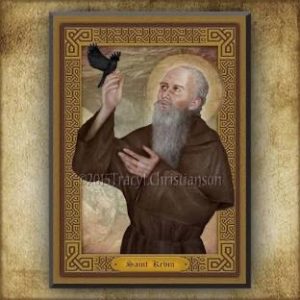
One of the major themes that appears in the stories of the saints of the early Celtic Church is how intimate they were with animals, and how much they valued the contributions animals made to their lives. I particularly love the story of St Cuthbert monk, bishop and hermit, associated with the monasteries of Melrose and Lindisfarne in Northumbria Northern England. Evidently he would stand waist-deep in the North Sea during his nightly prayer vigils. Afterwards two otters reputedly came and warmed his feet. Then there was Kevin of Glendalough. While praying with his hands outstretched, a blackbird built a nest in it and laid eggs. Kevin stood in trancelike stillness until the eggs hatched and the chicks flew away.
Animals are important for our physical, emotional and spiritual well being. Sit and think about your relationship to animals. In what ways to they enhance your spiritual well being.
And to round this off let me quote a Mary Oliver poem from Dog Songs
How It Is With Us, And
How It is With Them.
We become religious,
then we turn from it,
then we are in need and maybe we turn back.
We turn to making money,
then we turn to the moral life,
then we think about money again.
We meet wonderful people,
but lose them in our busyness.
We’re, as the saying goes, all over the place.
Steadfastness, it seems,
is more about dogs than about us.
One of the reasons we love them so much.
Note: as an Amazon Associate I make a small amount for purchases made through the appropriate links above.
Summer in America this year is extremely hot. When the temperatures and the humidity rise, I start dreaming of cooler places and checking in with all the folks I follow around the world who are building fires in July and wearing jackets rather than shorts and t-shirts. Even though I grew up in the South, I got spoiled living in the Northwest with it’s cooler summers and in Northern California where it could be really hot in the day time, but one would need a jacket as soon as the sun went down! Despite the heat, I am making an effort to embrace summer and take time to NOTICE the things that bring me joy along the way. NOTICING is a great spiritual practice that takes us out of our worry filled brains into the presence of God.
NOTICING involves stopping and paying attention.
NOTICING involves being curious.
The Practice of NOTICING allows God to surprise us along the way in our regular lives.
How has God been surprising you this week? What have you been noticing along your way that has brought you JOY? Take time to make a list, or paint a picture and/or look back through your photos to help you remember.
This week I was frustrated by how tired and unproductive I’ve been this summer! My husband reminded me that I am recovering from care giving and being on high alert due to my dad’s illness that started in the middle of May. Thankfully Dad is doing so much better that hospice dismissed him for now and we are planning to celebrate his 95th birthday next Saturday! I don’t know about you, but I can forget why I’m exhausted. I can forget why I’m feeling discouraged. I need to take the time to NOTICE my physical body and NOTICE the emotions I am carrying around with me in this body and take the time to process these emotions. I paint to help me process. I go take a walk. I lay in the floor or bounce on my exercise ball or even take a bath to help me get grounded enough to NOTICE what I’m really feeling and experiencing.
This week I’ve noticed the clouds as they’ve blown over our hill. It was actually cooler yesterday and I sat out on my porch and took time to watch the beautiful clouds in the sky. As kids, we used to take the time to imagine and watch for the different shapes in the clouds and make up stories about them, but as adults, too often we just worry about the rain! And speaking of rain, I actually noticed a beautiful rainbow this week when out walking the dog. It was over the city and this rainbow gave me a lot of hope for that day and for our town that has been plagued by white supremacy marches and so much gun violence this year! I might have missed the rainbow if I’d been looking at my phone or listening to a podcast while walking! I really try to practice phone free walks! That helps me notice! and it allows me space to listen to God and pray around the neighborhood!
And speaking of phone free…I’ve noticed just how addicted I am to my phone these days! Rob and I are discussing how to PRACTICE phone free fridays and truly make this a real sabbath practice. And we are wondering how we can host PHONE FREE gatherings for building community and friendship.
What are you NOTICING about yourself this summer? What emotions, feelings, stresses are you carrying around? What do you need to give to Jesus to carry for you?
My favorite author Joyce Rupp in May I Have this Dance says that July should be about PLAYING…and that children know how to NOTICE the little things along the way! She suggests that we take time to use a different sense each day this week. Taking time to NOTICE the smells one day, the sights another, the sounds you hear, the textures and things you touch on another day. Scientists have noticed that we are loosing our senses because we are all so screen focused! As a multi-sensory worship designer, this is frightening to me! I don’t want to lose the ability to notice the wonderful smells after a rain, or the touch and scent of fresh soil when planting flowers, or the feel of grass and gravel when walking barefoot!
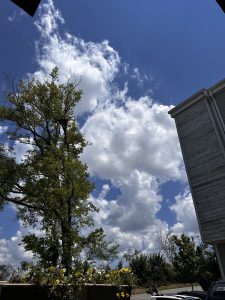
watch the clouds
Your homework assignment is to PRACTICE NOTICING this week! And watch for God surprises! Practice NOTICING with all your senses too! notice the colors, the sounds, the little things along the way that are signs of God’s love and the beauty of God’s creation!
What sounds do you hear just right now? I hear the freeway traffic and the birds at my birdfeeder outside.
What do you see? I see all my art mess on the counter, but also the hazy hills across the way and the beautiful brown and green velvety leaves of my magnolia tree right outside my window!
And don’t forget TASTE! Take time to taste your food this week! Notice the flavors and textures and be thankful! If you are in summer where you live, notice how different the blueberries taste. Notice how a ripe peach or a fresh melon from the farmers market can taste just like summer itself!! Today I am noticing all the wonderful flavor in my favorite cup of coffee! And the fresh mint that I put in my water!
And remember that this is a PRACTICE so you will need to practice! Don’t let it be a chore, just let it be fun to notice the clouds, the smells, the tastes and textures. If you need help with the PRACTICE of NOTICING, invite a child over to play! Kids are great at noticing the smallest details of life! They will watch a bug for minutes or play in the sand for hours or just enjoy the feeling of being in a swing or walking barefoot in the grass! Watch the clouds with a friend. Watch the sunset with your partner! Notice the colors and how the light changes in the rest of the sky.
Don’t be afraid to take time to just BE STILL and know that God is with you along the way! Allow Jesus to use the little things to show you his great love for you this week and RECEIVE THE GIFT of Noticing!
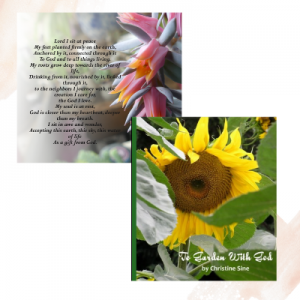 To Garden With God + Gift of Wonder Prayer Cards Bundle
To Garden With God + Gift of Wonder Prayer Cards Bundle
Need help getting into your stride with summer gardening? This unique bundle includes our best selling book, To Garden with God, and 1 set of Gift of Wonder prayer cards (12 cards).
“No matter how many challenges there are, nothing can take away from the deep satisfaction of getting one’s hands into the earth, digging, planting and harvesting the bounty of God’s good creation. Nor can they detract from the joy that engulfs as as we experience the awe inspiring generosity of a God who wants to provide abundantly for all of humankind. The garden is a place of healing, of wholeness and of deeply spiritual encounters where God restores our bodies and our spirits in a way that is truly miraculous.” (from To Garden with God)
It has been an exciting and challenging week for us here in Seattle.
The highlight for me was a trip that Tom and I made with our good friends Mark and Lisa Scandrette, to Camano Island. We began, as all such good trips should, with a stop at the Camano Commons to enjoy their delicious pastries and coffee and meet James Amadon, Executive Director of Circlewood. James led us on an excursion to the Circlewood Village site where progress is once more being made. Some of you may remember that this site was a part of Mustard Seed Associates and ten years ago we began work on the first building which was then vandalized twice, bringing construction to a halt. It was a delight to see that construction is once more in full swing. The project is scheduled to be completed by early fall, and will enable Circlewood to expand their onsite programming, focusing primarily on ecological discipleship, leadership, and practical earthkeeping.
As I worked on this part of our newsletter for this morning, I was prompted to revisit the litanies we used for the 24th Celtic retreat we held on Camano in August 2015, just after the vandalism. The week before the retreat my Meditation Monday: Through Broken Glass, reflected some of my thoughts in the face of this destruction. We then used the broken glass from the windows as part of our morning ritual. It was a very powerful symbol and meaningful experience. Here are the three litanies we used during the day, which I thought you too might like to revisit as a reminder of God’s ability to transform all the brokenness in our world and in our lives.
This reflection and litanies were very good ones for me to revisit yesterday as I wrote this newsletter as the temperature soared towards 91F. This is a rare occurrence in Seattle and not nearly as hot as some parts of the continent where it is expected to reach triple digits but still not easy for many who are not used to this kind of heat. My heart goes out to those who still don’t have power in the aftermath of Hurricane Beryl and face intense heat on top of the devastation already experienced, not just in Texas but also in Grenada, St. Vincent, the Grenadines, Jamaica, and the Cayman Islands. The challenges of climate change are very real and often destructive to lives and property. Our world is broken. It needs healing. Most of us feel both overwhelmed and useless in the face of such trials but it is good for us to consider how God would have us respond and help bring wholeness out of brokenness.
In this week’s Meditation Monday: Connecting Seasons and Celebrations to Our Lives I explored the rhythms and rituals that govern our lives. For most of us these are more associated with the rhythms of the seasons than those of the liturgical calendar. I also commented “The rhythms and rituals of summer are intertwined with the changing weather and its impact on our lives” It is the heat of summer and the cold of winter, the summer hurricanes and winter storms that still shape how we spend our time. I am more convinced than ever that we need to give our liturgical celebrations a local flavour and shape them by giving attention to indigenous wisdom and its contact with the land, waters and sky of each place in this wide world.
I loved Diane Woodrow’s post on Godspacelight yesterday – Walking Away from Oughts in which she talked about writing into her passion rather than doing “What she ought” to be doing. Good advice for all of us who feel compelled to do things we don’t really enjoy.
In her Freerange Friday: Praying For Your Country Lilly Lewin encouraged all of us to pray for our countries. So many of them face momentous change and upheaval at the moment and we need to take seriously our responsibility to pray for them.
Wednesday last week we published our 11th episode of Liturgical Rebels, an inspirational interview with iconographer Kelly Latimore. Make sure you don’t miss listening to this episode. Or the 10 that have gone before it. Also we would love to know what you think of the podcast. I have received enthusiastic responses from several listeners but would appreciate your feedback too. Which is your favourite episode? What kinds of people would you like to hear from? Do you have suggestions for potential guests?
As we look around at our fractured world and consider the brokenness of our own lives, I am reminded of the ancient Chinese philosopher Loa Tzu’s words: “New beginnings are often disguised as painful endings…”
In the midst of painful endings,
in the midst of brokenness and heartache,
may we seek to love and not to hate,
may we seek for peace and not for war.
May we see God’s new beginnings emerge,
for ourselves, for this place, for God’s world.
Let us welcome everything that comes to us today.
It is for our healing.
It is for the healing of relationships,
It is for the healing of this land.
Let us release all that binds us.
It is for our healing,
It is for the healing of relationships,
It is for the healing of this land.
Let us open ourselves to God.
It is for our healing,
It is for the healing of relationships,
It is for the healing of this land.
Many blessings on you today
Christine Sine
In Christine Sine’s newsletter to those of us who write for Godspacelight she talked about writing into her passion. This is probably one of the bests prompts I’ve had in ages. I have tried writing what I ought to write. I even set up a Substack account to write about writing for well-being but it’s failed. Why? Because, much as I love free writing for my own well-being, I wasn’t writing into my passion. I was trying to be something I wasn’t. I even tried putting in a regular structure to when I blogged but I’m afraid that isn’t me.
How often do we do that – try to be something we are not? Whether it is in what we write or what we do? I think of many times when I have done something – job or ministry – that is so significant but isn’t me. Too many times to remember. It could even be something I’m good at, have talents in, but it isn’t my passion. I suppose if one jargoned it up I could say it wasn’t “my calling.”
As I’ve got older I’ve learned more and more not just what my skills and talents are but what I am passionate about. I love people, though I need time alone with a book too. If I’m honest my perfect day would be to go for a dog walk, coffee and breakfast with a friend and have a rolling, random conversation that covers deep and meaning as well as trivial and silly; come home and write a blog piece on something that either the conversation has triggered or that was buzzing in my head; and finish the afternoon on the couch to have a read of a good book, then maybe some intense Netflix drama with a glass of red wine to finish the day. Somewhere in that I’d like to ponder writing a short story or flash fiction, though maybe never get to write it; I’d like to email someone I enjoy writing to; run a writing workshop where I encourage others to get the most from putting pen to paper; and probably free write or journal myself.
But I can get into thinking I “ought to” write X, Y or Z; I “ought to” be connecting with a certain person or group and “ought to” be doing something with them. But that is my “oughts and shoulds” and not my passion coming through.
I’ve just read Timothy Keller’s The Prodigal God in which he talks of the older brother attitude being the one that says “it’s not fair” when God doesn’t do as we think they should do because we were “good Christians”. My “ought to” comes, I think, from a place that is where I’ve decided what a “good Christian” or a “good writer” would/should do. It isn’t coming from a place of my passion.
I think for all of us there are times when we do not run with our passions for many reasons; a need to fit in, a fear of missing out, having been told by a parental figure that life isn’t meant to be about fun, or whatever. I’m sure we all, if we allow ourselves to really hear our hearts, can come up with many reasons why we don’t follow our passions in work, in writing, in church stuff, in life in general. All of them have some truth in them but remember the devil goes around like a angel of light. The one who keeps us away from our true selves does it subtly not overtly. If it was overtly we would notice and rise above it. But it is filled with limited truths and comes from people who do care for us and want the best for us. But it is still lies if it keeps us from our passions and our true selves.
I’m grateful to all the healing that I’ve received so I can hear God clearly, hear my heart clearly, and be bold enough to step out into my passions. I’m also bold enough now to walk away from when I’ve try to do something that looks good but isn’t me; when I’ve done an “ought”. But this has come about because I know God loves me unconditionally all the time – not just when I get it right/write 🙂
 Summer practices bundle
Summer practices bundle
This summer treat yourself to some supports for the hospitality, gardening, and wonder of the season. This bundle includes Gift of Wonder prayer cards for devotion time, the Godspacelight Community Cookbook for those summer guests and Christine’s book Digging Deeper: the Art of Contemplative Gardening.
As an Amazon Associate, I receive a small amount for purchases made through appropriate links.
Thank you for supporting Godspace in this way.
When referencing or quoting Godspace Light, please be sure to include the Author (Christine Sine unless otherwise noted), the Title of the article or resource, the Source link where appropriate, and ©Godspacelight.com. Thank you!


